The 8 best pets for families and how to choose the right one for you
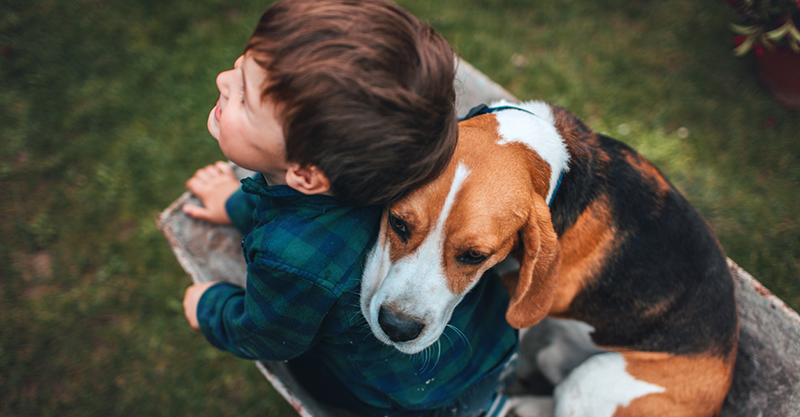
A well chosen pet can bring years of joy to a family and help to teach kids about responsibility, companionship and leadership. But before you rush out to buy that cute kitten you’ve seen for sale at the pet store, it’s important to consider whether the pet you’ve chosen will suit your lifestyle, space limitations and your kids’ ages.
Not all pets are created equal
The first things to consider when choosing a pet that suits your family are:
- Attention: Some pets are needier than others, requiring more attention or care. Do you have enough time for a dog? Perhaps a fish might be more your style.
- Space: Does your home and yard have enough suitable space for an outdoor pet, and is it fenced? Can you fit a rabbit hutch or chicken coop?
- Allergies: Some animals may set off allergies for those in your family sensitive to pet hair or dust.
- Insurance: Vet bills add up very quickly, so if your pet is sick or injured this can be very handy. Can you afford pet insurance?
- Vaccination and desexing: You’ll need to arrange with the vet the appropriate vaccinations and discuss neutering. Unless you want to breed, spaying is essential for cats and dogs.
- Microchipping and permits: You will also need to have your pet microchipped and possibly register it with your local council. Call your council or visit their website to find out what the rules are where you live, as it can differ from place to place.
- Travel: If you travel a lot, will they be able to come with you? Do you have friends or family who can feed and exercise them for you when you are away? If not, you might be looking at the added expense of booking them into a boarding kennel when you are travelling.
I also strongly urge you to consider buying from a pet shelter wherever possible – you’ll be saving the life of a needy animal and helping the shelter at the same time.
The best pets for families
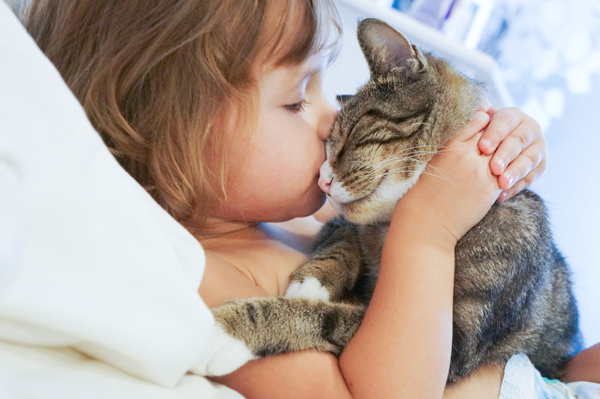
Cats
Cats are wonderful family pets – they each have a distinct personality and are often affectionate and happy to be handled. The joy a kitten brings to a household is infectious, and they are fairly low-maintenance pets once they’re fully grown.
When choosing the right puss for you, consider the breed carefully – some breeds are known to be more affectionate than others, and a long-haired cat WILL cover your clothing and furniture in hair. It’s definitely worthwhile investing in a lint brush – those things are a godsend when you have a cat that enjoys sleeping in baskets filled with clean washing. I also strongly suggest buying or making a scratching post – better they sharpen their claws on that than your lovely couch!
But cats may not be for everyone – a cat can live longer than 20 years, are you ready for that commitment?
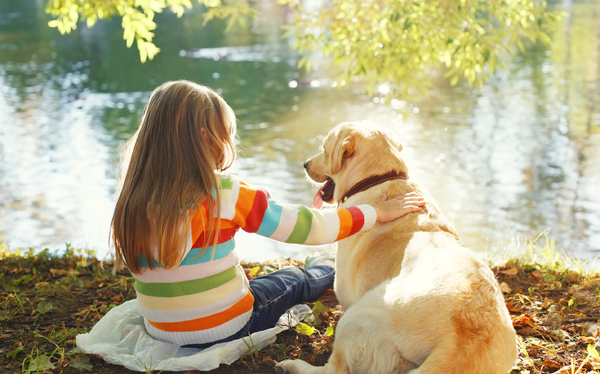
Dogs
Choosing a dog starts with selecting a breed that will suit your home and lifestyle. A large dog will need plenty of space and more food than a small one. And this might seem obvious, but a fenced yard is a must – dogs love to roam and will take any opportunity to get out and explore the neighbourhood.
It’s also important to check on a dog breed’s general temperament, as they can differ wildly. While some dogs are calm and quite happy to sit at your feet all day, others can be noisy, boisterous or may be prone to lashing out when surprised or frightened.
Daily exercise is essential for dogs, whether it’s a game in the backyard with a ball or a run along the beach. If you don’t exercise them enough, you run the risk of your dog displaying boredom behaviours such as digging, howling and escaping from the yard. This is a commitment that can be a pitfall with dogs, so it pays to think about this carefully – will you be happy to walk it on cold winter mornings and hot summer days?
Other things to consider are whether you can afford puppy training, grooming and the ongoing costs of their food and vet care.
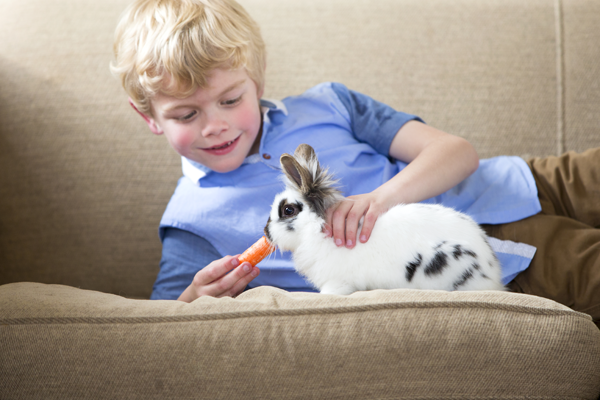
Rabbits
Rabbits can be quite affectionate and intelligent when socialised from a young age. They can be litter-box trained and can learn to play with and respond to their owners.
Bunnies are sociable creatures and will thrive when they have a companion rabbit rather than living alone. But be sure to get bunnies of the same sex, or you know what comes next!
Rabbits need a good sized rabbit hutch which can be indoor or outdoor, but beware – rabbits can succumb to severe heat and cold so it’s best to have them inside in extreme weather. You will ALWAYS need to supervise your bunny if you let him loose inside – they love to chew through electrical cables and find dark hideaways under beds and in cupboards.
It is important to learn the proper way to pick up or hold a rabbit so as not to hurt its back, so this may not be the best pet for younger children.
It is illegal to own rabbits as pets in Queensland as they are considered a pest.
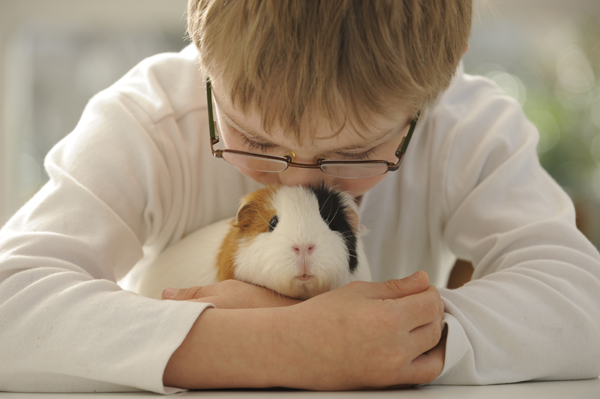
Guinea pigs
Guinea pigs are great for kids, happy to be handled if they’ve been socialised well from a young age and love to be snuggled gently. Like rabbits, they can tend to get lonely, so guineas are best kept in pairs but again, make sure you have the same sex or they WILL breed.
Guinea pigs need to be kept in a roomy cage that is cleaned daily. Otherwise, they are a fantastic low-maintenance pet that don’t make much mess or eat a great deal, so they make a wonderful first pet for children.
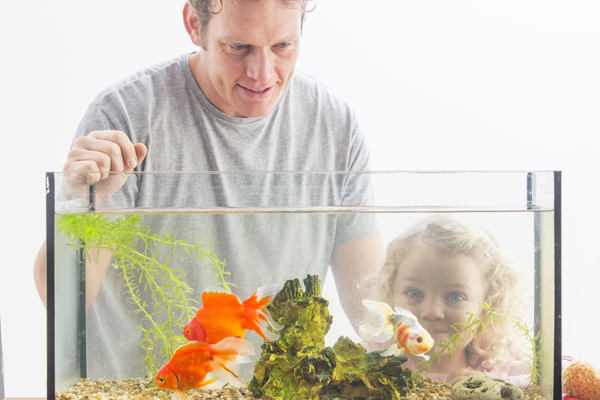
Fish
Fish are good pets if you spend a lot of time out of the house, since they don’t need entertaining or supervision. It can be costly to set up a tank but once you have, the costs are minimal, which makes fish a very popular pet choice with families.
As some fish are predatory towards others, it’s important to speak to the pet store to ensure you get fish that will get along. You don’t want to come home from school to find Brian has eaten Betty!
Their tank will need regular cleaning and water quality maintenance.
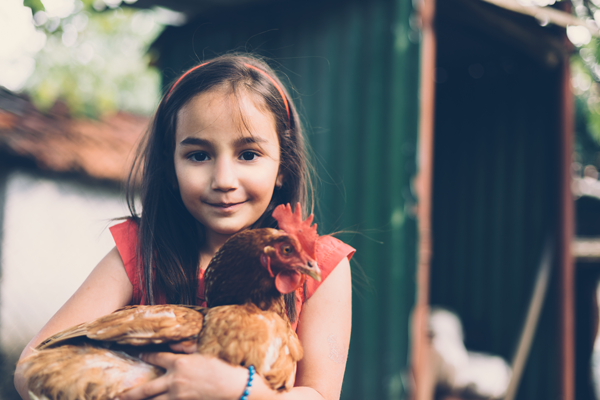
Chooks
Believe it or not, chooks make fabulous family pets and are often affectionate – some even love to be picked up for a cuddle. There are lots of beautiful and distinctive breeds to choose from and let’s face it, baby yellow chicks are sooo cute!
Chooks are quite low maintenance, too. You’ll need a yard big enough to house a chicken coop, where they’ll rest at night and lay their eggs. Your chookies will eat ticks and insects which can only be a bonus! They need their coop cleaned regularly – this will keep parasites at bay and gives you cleaner eggs.
It can be hard to determine which chicks are roosters until a few weeks old. You can keep roosters, but they can be noisy and sometimes aggressive. However they are excellent security guards and will become very defensive of their flock of ‘ladies’. A rooster will also fertilise your hens’ eggs – so if you want to eat your eggs, don’t keep the rooster!
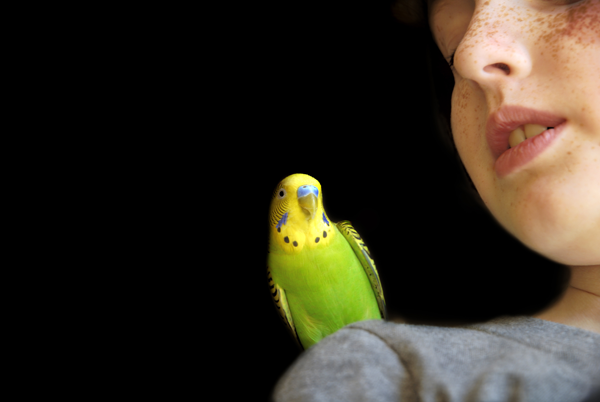
Birds
If you’re keen on having a pet bird, choose carefully as some are more suited to human interaction than others. Budgies are a popular choice because they can can be quite affectionate and enjoy handling, and cockatiels can be trained to talk and sometimes do tricks.
You’ll need a cage to suit the birds’ adult size – they need to be able to flap their wings without touching the sides of the cage.
As birds can be quite fragile, they may not be the best choice for little kids – you’ll need to teach them to be gentle and always supervise them when they are handling the bird.
Some families enjoy letting their bird out of the cage inside the home occasionally. The downsides to that – not only will you find bird poo in the strangest of places, they are also the ultimate flight risk (obvs!).
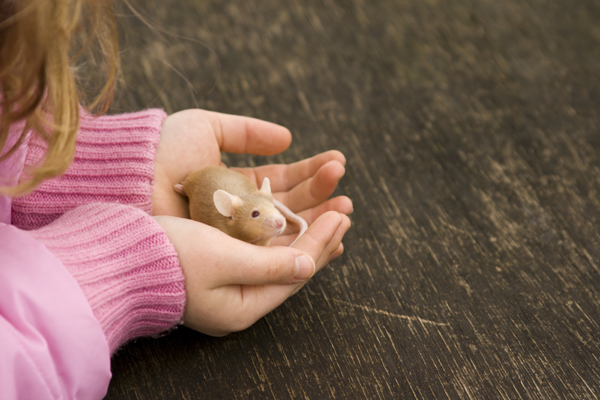
Rats and mice
These guys are a popular choice for families as they don’t take up much room or cost a lot to keep. Just a small tank or cage with a few toys will do, which will need cleaning out weekly so it doesn’t get smelly (rats love to hoard food which can add to the pong).
Rats are quite intelligent and can be taught to perform tricks – most enjoy handling if they are socialised from a young age. They can be very sensitive to temperature, so you’ll need to keep their cage out of direct sunlight.
Mice and rats are very social animals, so it’s best to have two or more but again, be sure to get them in the same sex or you’ll end up with LOTS of little mice to deal with!
Does your family include any furry, feathered or finned friends? Which pets do you think are the best (and worst!) for families?









